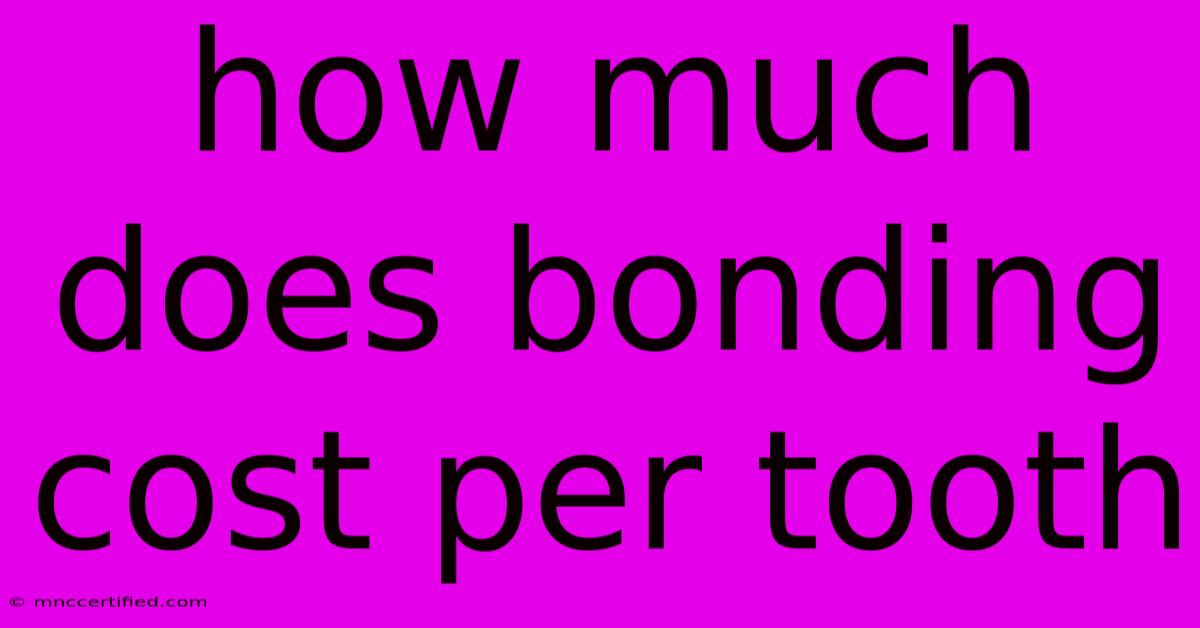How Much Does Bonding Cost Per Tooth

Table of Contents
How Much Does Bonding Cost Per Tooth? A Comprehensive Guide
Have you ever chipped a tooth or noticed a gap in your smile? Dental bonding might be the perfect solution for you. This cosmetic dental procedure uses a tooth-colored composite resin to repair and enhance your smile. But before you schedule your appointment, you might be wondering: How much does bonding cost per tooth?
This guide will break down the factors that influence bonding costs, provide estimated ranges, and offer tips on how to make the procedure more affordable.
Understanding the Cost Factors
The price of dental bonding can vary significantly depending on several factors:
1. Location: Bonding costs can differ based on your geographic location. Urban areas often have higher costs compared to rural areas.
2. Dentist's Experience: A more experienced dentist may charge a higher fee due to their expertise and reputation.
3. Complexity of the Procedure: Simple repairs, such as filling a small chip, are typically less expensive than more complex procedures like closing gaps or covering discolored teeth.
4. Number of Teeth Treated: The more teeth you get bonded, the higher the overall cost will be.
5. Additional Services: If you require additional services like teeth cleaning or X-rays before bonding, those costs will also be factored in.
6. Insurance Coverage: Dental insurance plans may cover a portion of the bonding cost, but coverage varies greatly.
Estimated Costs for Bonding
While the cost of bonding can fluctuate, here's a general estimate:
- Single tooth bonding: $100 to $500 per tooth
- Multiple tooth bonding: $300 to $1,500 per tooth
Keep in mind that these are just estimates. It's essential to consult with a dentist for an accurate quote based on your specific needs.
Ways to Reduce Bonding Costs
Here are a few tips to help you save money on dental bonding:
- Shop around: Get quotes from multiple dentists in your area to compare prices.
- Ask about payment plans: Many dental practices offer financing options or payment plans to make the procedure more manageable.
- Consider dental insurance: Check if your insurance plan covers any portion of bonding costs.
- Take advantage of discounts: Some dentists may offer discounts for new patients or during specific promotions.
Benefits of Dental Bonding
Besides enhancing your smile, dental bonding offers several other advantages:
- Non-invasive: Bonding is a minimally invasive procedure that doesn't require drilling or removing tooth structure.
- Versatile: It can be used to repair various dental imperfections, including chips, cracks, gaps, stains, and discolored teeth.
- Fast and Convenient: The bonding procedure is typically completed in one visit.
- Natural-looking: The tooth-colored resin seamlessly blends with your existing teeth.
Conclusion
While the cost of dental bonding per tooth can vary, it's a relatively affordable and versatile cosmetic procedure. By understanding the factors influencing the price and considering the tips mentioned above, you can find a solution that fits your budget and enhances your smile. If you're considering bonding, schedule a consultation with your dentist to discuss your options and get a personalized quote.

Thank you for visiting our website wich cover about How Much Does Bonding Cost Per Tooth. We hope the information provided has been useful to you. Feel free to contact us if you have any questions or need further assistance. See you next time and dont miss to bookmark.
Featured Posts
-
Chelsea Arsenal 3 Things We Learned
Nov 11, 2024
-
Title Insurance For New Construction
Nov 11, 2024
-
What I Learned From Yellowstone
Nov 11, 2024
-
Chelsea Vs Arsenal 3 Key Takeaways
Nov 11, 2024
-
Wales Vs Fiji Fiji Wins In Cardiff
Nov 11, 2024